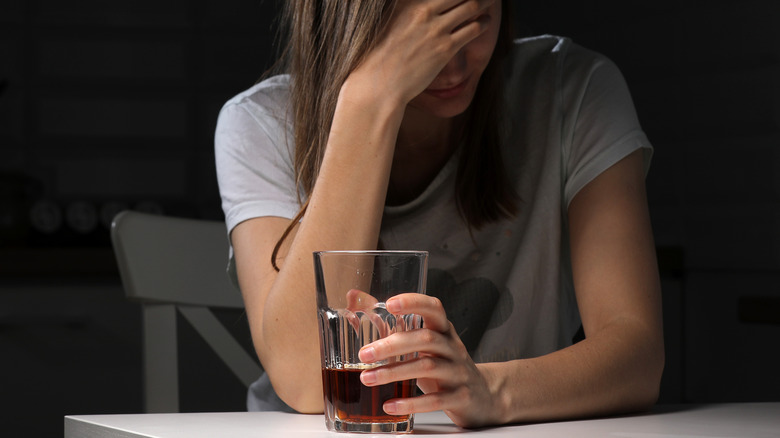The Real Reason Women Are More Affected By Alcohol Than Men
Some already know that men are more likely to be addicted to alcohol compared to women, but it does not tell the whole story. Generally speaking, men are twice as likely as women to binge drink, however, this is changing for younger generations (per U.S. Centers for Disease Control and Prevention). A 2016 study published in BMJ Open found that among those born in the early 20th century, men were 2.2 times more likely than women to consume alcohol, and 3 times more likely to drink alcohol in ways suggestive of problematic use. Among those born in the late 1900s, men were 1.2 times more likely to drink alcohol in ways suggestive of problematic use compared to women, marking a decline.
Data published in the Education Resources Information Center in 2020 suggests that female adolescents (8th grade) were drinking as frequently as their male counterparts. Experts told The Washington Post that part of this may be due to changes in gender roles and alcohol marketing. Regardless of the reason, it is not good news, as women suffer negative health effects from alcohol more quickly than men do. "Females are more susceptible to the unwanted biological effects of alcohol when they consume the same amount of alcohol and at the same frequency — even when you adjust for weight," Gyongyi Szabo, a professor at Massachusetts Medical School, told The Post. But why are women more affected by alcohol than men?
How and why alcohol has a stronger effect on women
According to the National Institute on Alcohol Abuse and Alcoholism (NIAAA), women are more susceptible than men to alcohol-induced blackouts, memory impairments, cirrhosis, and damage to the nerves and heart. You may already know that people with smaller bodies aren't able to tolerate as much alcohol, as they reach a high blood alcohol concentration more quickly (per Stanford University). However, there is more to it than that. Women have a stronger and faster reaction to alcohol, even at a similar body size. It may be because they produce less alcohol dehydrogenase (ADH), an enzyme that breaks down alcohol (per The New England Journal of Medicine).
For the above reasons and others, the U.S. Centers for Disease Control and Prevention recommends that women have no more than 1 drink per day. If you have more than 3 drinks within 2 hours, it is considered binge drinking. Because of the varying levels of alcohol in different types of beverages, the NIAAA defines "a drink" as 12 ounces of regular beer, 8 ounces of malt liquor, 5 ounces of wine, or 1.5 ounces of distilled spirits.


